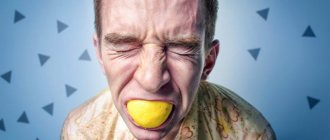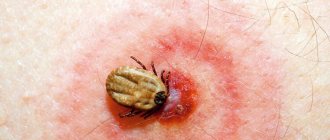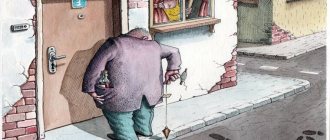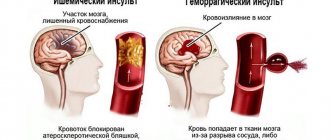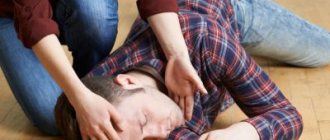Withdrawal refers to specific painful manifestations characteristic of the syndrome of deprivation of habitual doses of a psychoactive substance (PAS). The condition develops in a person addicted to drugs. The patient’s status is so severe that those close to him or relatives around him have a question: how to help a drug addict during withdrawal.
In medical language, the problem is called abstinence, it is a consequence of physical dependence. If a patient develops a painful complex of complaints and deviations, then we are talking about an advanced case of drug addiction.
Heroin withdrawal syndrome
The drug acts on special parts of the brain responsible for the production of so-called “joy hormones”. Because of this, a person feels euphoria, a buzz, he is incredibly sociable and cheerful. As soon as the effect of the substance wears off, the mood is replaced by apathy, depression and indifference.
What it is
Why does withdrawal occur? Any narcotic drug completely restructures the functioning of all internal organs. After the dose is not received, the brain begins to require it to continue the functioning of the systems.
Heroin withdrawal syndrome is one of the most painful and long-lasting. The name “withdrawal” appeared for a reason - a person has the feeling that his body is being passed through a meat grinder.
HOW TO HELP A DRUG ADDICT IF HE DOESN'T WANT TO BE TREATED
How does heroin withdrawal work?
Symptoms of heroin withdrawal are:
- During the day after the last use of the drug, slight nervousness, panic, lack of appetite and sleep are felt. For now it’s possible to endure this.
- After 2 days, a person feels the same as with a cold - his eyes are watery, his nose is stuffy, and a cough may appear. In this case, there is chills and increased sweating.
- After 3 days, the drug addict’s condition begins to resemble food poisoning - nausea, vomiting, diarrhea, hand tremors and headache.
- 4 days after taking heroin - pain throughout the body, panic attacks, hallucinations, skin turns gray. At this stage, many drug addicts commit suicide.
The withdrawal state also becomes a reason for committing a crime - robbing or killing another person.
When does it start
Withdrawal syndrome begins to appear within 7-15 hours after the last drug intake. It is impossible to indicate an exact period - it all depends on how long and often the addict has been using heroin.
Addiction
Drug addiction is an uncontrollable craving for taking psychoactive drugs. This desire to use drugs is so strong that the addict forgets about everything else and devotes his entire life to searching for drugs and using them. Life in such a rhythm can last for months or years, it depends on the type of drugs, the patient’s state of health, and how lucky they are - after all, most often drug addicts die from overdoses. Why can’t a person stop even when a disease completely destroys his life?
After all, drugs poison the entire human body and do not spare a single organ of the body. Their wastes are carried by blood to all tissues and organs, settle in them, gradually destroy their structure and lead to pathologies. This is why drug addicts often become victims of internal organ diseases. A person’s whole life changes. He becomes asocial, loses emotional connections with others, loses interest in life, and is deprived of moral principles.
The severe dependence on drugs is explained simply. Pathological cravings for them are expressed in two types of addiction. These are physical and psychological cravings to use. First, the addict develops a mental attachment. Taking drugs is perceived in a rosy light, brings vivid impressions and comfort. The drug is used more and more often, then regularly, later 2-3 times a day (depending on the type of drug addiction), this is how physical dependence on it is formed. This means that the narcotic substance has become a full participant in biochemical processes in the human body.
Symptoms of withdrawal in a drug addict
In addition to physiological symptoms, a person may also exhibit psychological ones - lack of sleep, obsessive thoughts about death or surveillance, as well as hysterical behavior. Insomnia can lead to a stroke or heart attack, since the body wears out 2 times faster.
How does a drug addict feel?
Only those who have experienced this state can understand how a drug addict breaks down. Even those who are in remission remember with horror the pain of quitting drugs. Many deaths occur precisely under the influence of withdrawal syndrome, as a result of a malfunction of the heart, kidneys or lungs, or suicide.
How do the first signs appear?
The very first “bells” about approaching withdrawal are nervousness, hysteria, the addict becomes twitchy. The pulse may begin to falter, and periodic spasms may be felt in the muscles. At the same time, the skin itching intensifies, the secretion of sweat with an unpleasant pungent odor increases.
Find out treatment recommendations without leaving home for free
To select a treatment plan, you just need to leave a request, we will contact you to select the time and specialist you need
Submit your application
Literature:
- General and private narcology / I. N. Pyatnitskaya. - Moscow: Medicine, 2008. - 637 p.
- Life without drugs / O. F. Eryshev. - M.: AST: Astrel, 2005 (OJSC Polygraph Plant named after Y. Kolas). – 159 s
- Drug addiction (nature and overcoming): textbook / S. K. Bondyreva, D. V. Kolesov; Russian academician Education, Moscow Psychological and Social Institute. - Moscow ; Voronezh: Moscow Psychological and Social Institute, 2006. - 430 p.
Need some advice?
OR CALL A DOCTOR
CALL!
+7
Coming off heroin
How can you tell if a person is a heroin addict? A drug addict who has not been using for too long often reveals himself during the period of withdrawal or withdrawal. The following signs should alert you:
- A sharp change in mood, especially if the person was previously quite calm;
- glassy gaze, dilated or, conversely, constricted pupils that do not respond to light;
- as soon as the effect of heroin wears off, appetite may disappear, while thirst increases;
- a complete change in social circle, family and friends begin to irritate, while the addict cannot control his behavior;
- lethargy and drowsiness.
Have you noticed these signs in a loved one? We need to watch him more closely. Syringes in bags or trash cans, secret calls, suspicious conditions, missing valuables from the house - if drug use is confirmed, immediate action must be taken.
Working with codependents
Codependent people can become a stronghold of salvation for the patient or, conversely, lead to a breakdown. The psychologist’s task is to re-teach such people to live together. Discuss the problems that provoke conflicts, teach them to trust each other.
In relationships with codependent people, it is important to create an atmosphere in which no one blames anyone. Because any complaints or accusations provoke conflict, potential relapse and a return to drug use.
Often people have breakdowns because they feel lonely. They lose the motivation to control themselves. Own excuses arise related to the fact that there is nothing to lose, that no one needs a person. Therefore, along with psychotherapy, the patient must undergo consultations for codependent people.
How to survive withdrawal from heroin addiction
What helps with withdrawal symptoms? Heroin is one of the hardest drugs, and withdrawal symptoms during its withdrawal are a terrible combination of physical pain and mental disorders. Today, narcologists offer a number of procedures that will help overcome withdrawal symptoms.
DETOXIFICATION
One of them is UROD (ultra-rapid opioid detoxification). This is the cleansing of special receptors in the brain from drug residues and its breakdown products. It is performed under general anesthesia. UBOL does not replace detoxification of the body.
What to do during an acute period
The acute phase of withdrawal occurs approximately 3-4 days after the last dose of heroin. In some cases, a person loses consciousness and breathing becomes difficult. The only correct decision at this moment is to call an ambulance and turn the drug addict on his side until the brigade arrives. This must be done so that he does not choke on vomit.
It is unacceptable to use sedatives, give teas or herbal decoctions. The effect of traditional medicine in such a situation is unpredictable. You can’t leave a person alone - he can attempt suicide at any moment.
Psychological craving for drugs
Many accuse drug addicts of immorality, irresponsibility, and self-centeredness. And you know, they're right. Only in this case we are looking through the telescope from the other side. Addicts certainly have these qualities. Some of them are a consequence of the disease. In order to get a new dose, in order to get rid of withdrawal symptoms, the addict resorts to deception, manipulation, and crime.
Some of the qualities that prevent a person from having good and effective relationships with others were observed before the illness. Let's say more, they were the reason that pushed a person onto the path of drug addiction. None of us wants to be unhappy, unsuccessful, or lead a life full of disappointments. Would you like to? A person prone to addiction is looking for at least some ways to establish contacts with the environment or at least distract from defeats.
At first, psychoactive drugs really help to get emotional euphoria, a new circle of friends, and even sometimes an increase in status in one’s social group, which is more true for teenagers. This becomes an excellent bait for the psyche, the use of drugs or alcohol is associated with positive impressions, and a conditioned reflex is formed. This is how psychological dependence on psychoactive drugs is born.
Relieving heroin withdrawal
The physiological mechanism of heroin withdrawal is such that it is not enough to relieve withdrawal symptoms alone. It is important to help the brain receptors get rid of drug residues and its breakdown products. Therefore, in difficult cases, UBOD is carried out, and only after that - droppers. They cleanse the body, and the doctor may also prescribe a sedative to normalize sleep and the mental state of the drug addict. The infusion solution and the number of procedures are prescribed strictly individually, depending on the severity of the patient.
We will select an individual treatment plan
Free consultation 8-800-200-27-23
How to help at home
Theoretically, if a person has been using heroin for less than two months, it is possible to go through withdrawal on their own, while at home. In reality, there are practically no such cases - already at the second stage of withdrawal syndrome, the addict cannot withstand this state and administers a new dose. Another option is that the relatives themselves, unable to watch their loved one suffer, give him the drug.
Searching the Internet for recipes to overcome withdrawal symptoms is not only useless, but also harmful. For example, herbal infusions can cause bleeding or an allergic reaction, since the body is already weakened by taking the drug. Many people confuse heroin withdrawal with a hangover - in the first case, the condition cannot be alleviated with chicken broth or orange juice. All drug addicts describe withdrawal with one succinct word - “hell.”
Therefore, the best help is to call a narcologist or place the person in a clinic. It is worth noting right away that it is preferable to treat drug addiction in a hospital. It will be easier for the doctor to monitor the patient’s condition and prevent a sad outcome. An addicted person, even after withdrawal symptoms have been relieved, may behave inappropriately.
REMOVAL AT HOME
Relieve the condition with medications
You should not give medication to a drug addict yourself. There is a misconception that withdrawal symptoms can be relieved with strong sedatives or sleeping pills. All that such pills can do in this situation is to help a person get hooked on them instead of heroin.
After completing the detoxification course, the doctor will select medications to normalize the psyche and sleep. Drugs that restore the liver may also be needed. The program for relieving withdrawal symptoms and further treatment is always individual.
TREATMENT OF DRUG ADDICTION IN A HOSPITAL
Rehabilitation
The time when a person does not use drugs is called remission. There is an opinion that people who have used the drug at least once always remember its effect. This memory can force them to start using again at any moment.
The task of rehabilitation therapists is to change the patient’s social and personal identity. It is important to change beliefs about drugs, instill new values to restore its stigmatization in society.
In addition to psychological work, heroin addicts require intensive pharmacological support. If rehabilitation is not carried out comprehensively, there will be no result.
What does the rehabilitation course include:
- assistance in eliminating withdrawal symptoms (it will happen in any case);
- psychological support throughout the treatment and after it;
- working with codependent people, friends and family members;
- limiting contact with people who actively use;
- maintaining physical and mental activity;
- constant search for interests, mastering new skills or professions;
- use of replacement therapy and other pharmacological agents if necessary.
Before starting the active rehabilitation process, heroin addicts undergo special therapy to “cleanse” the body of the drug. Then, with the help of sleep or painkillers, they are helped to survive withdrawal.
There is no correlation between whether a person will use again or not if he experiences withdrawal without additional pharmacological support. Therefore, it is better to relieve the patient’s pain and allow him to endure the critical period without another breakdown.
Be careful, as the patient will try, under any pretext, to find a way to use again. He is capable of deception or even the use of brute physical force, which is why rehabilitation should take place in special medical institutions.
Get help now
Do any of your relatives or friends have an addiction? Have you tried in every possible way to help, but as a result the person still returned to his past life?
You are not the first to encounter this problem, and we can help you.
We guarantee anonymity, we will persuade you to undergo treatment, and we will help you choose a center.
Call us
+7
or
Call me
Treatment prices:
| Service | Price, rub) |
| Types of therapies | |
| Standard detoxification therapy | 3 500 ₽ |
| Double Detox Therapy | 6 000 ₽ |
| Enhanced Detoxification Therapy | 7 500 ₽ |
| Maximum detoxification therapy | 9 500 ₽ |
| Quick sobering up at home | 7 500 ₽ |
| Hospital at home 1 day | 22 000 ₽ |
| Advanced hospitalization | 15 000 ₽ |
| Treatment in hospital | |
| Accommodation | |
| Economy chamber (6 beds) | 2 000 ₽ |
| Standard room (4 beds) | 3 000 ₽ |
| Increased comfort (2 seater) | 5 500 ₽ |
| VIP chamber (1 person) | 12 500 ₽ |
| Individual post 24/7 | 5 000 ₽ |
| Medical and social rehabilitation 21 days | 140 000 ₽ |
| Service | Price, rub) |
| Initial consultation with a narcologist | for free |
| Consultation with a psychologist | 3 000 ₽ |
| Psychiatrist consultation | 5 000 ₽ |
| Coding at home Torpedo | 7 500 ₽ |
| Express output and encoding (doublet) | 13 500 ₽ |
| Coding using the Dovzhenko method | 12 000 ₽ |
| Hypnosis classic session | 13 000 ₽ |
| Ericksonian hypnosis session (NLP) | 8 000 ₽ |
| Coding method Torpedo | 5 500 ₽ |
| Double block | 8 000 ₽ |
| Esperal injection for 1 year | 9 900 ₽ |
| Tetlong for 3 months | 10 500 ₽ |
| Esperal gel for 1 year | 15 000 ₽ |
| Selincro course of therapy | 12 500 ₽ |
| Implantation of Disulfiram for 1 year | 18 000 ₽ |
| Vivitrol injection for 1 month | 26 000 ₽ |
| Naltrexone stitching for 3 months | 35 000 ₽ |
| Neuroimplantation Prodetoxon for 6 months | 47 500 ₽ |
| Narcopsychotherapy session | 50 000 ₽ |
| Neutralization of encoding | specify |
| Psychodiagnostics / pathological diagnostics | 7 500 ₽ |
| Psychotherapy session | 5 000 ₽ |
| Family psychotherapy | 6 000 ₽ |
| Outpatient rehabilitation in Moscow | 33 000 ₽ |
Expand
The danger of another breakdown remains for life. Therefore, it is important to constantly work with a psychologist. A specialist will help identify internal problems that often lead to drug addiction. In addition, it is necessary to work with the patient’s family - almost 80 percent of drug addicts’ loved ones behave completely incorrectly, aggravating the situation.
Leave a request for a free consultation with a specialist
We will contact you as soon as possible
- — Anonymous
- - For free
- — Around the clock
The advantage of treatment in the clinic is that each patient has the opportunity to be accompanied by a doctor after completing the course. This means that a person can call the doctor at any time and find out how to overcome insomnia, drug cravings, nervousness, fear, etc. Family support and a good specialist make up 50 percent of the success of treatment. The remaining 50 is the desire of the addict himself to get rid of the addiction.
Article prepared by an expert
Terekhova Anna Vladimirovna
psychologist-consultant on socio-psychological work with addicted clients and their families. More than 9 years of experience.
Similar articles:
How to determine the presence of drugs in the blood
What to do if an addict does not want treatment?
The effect of opium on the body
Alprazolam (Xanax) is the most popular drug among young people
What is detoxification and why is it important in treating chemical dependency?
2 comments on “Heroin Withdrawal”
- Vania:
December 9, 2021 at 02:41 pm
Withdrawal from heroin begins on the third day after the last dose. The condition can last from 5 to 15 days, but it all depends on individual indicators. For some drug addicts, the symptoms subside on the 5th day, and by the eighth day they feel completely healthy. It is necessary to understand how it works and what exactly changes in the body. This drug is based on an opiate, or more precisely, opium alkaloids. The drug belongs to this group
Answer
- Veronica:
December 15, 2021 at 16:05
If the addiction began much earlier, it is better to contact a professional narcologist. Many private doctors practice relieving symptoms and withdrawal symptoms at home. In addition, clinics also offer such services. For example, our Nika-Israel clinic relieves symptoms. Doctors use only the most modern, innovative drugs approved by international medical organizations. Thus, yesterday's drug addict completely gets rid of the consequences of drugs and can safely start life from scratch.
Answer
Resocialization
Resocialization is the patient’s return to an active social life, restoration of family relationships, employment and search for new friends. At this stage, it is important to provide the most comfortable conditions and protect contacts with people who actively use drugs, even if it is not heroin.
The confessional (with a religious bias) approach is more successful than other methods of resocialization without a confessional component.
Taken from the dissertation: “Resocialization of drug addicts: socio-psychological aspects” by Kutyanova I.P.
Resocialization should occur step by step, from less to more. A classic example is 12 step resocialization.
Medication assistance
Taking medications makes the withdrawal process less painful and helps cleanse the body of opiates. Additionally, these medications are designed to relieve the discomfort that is inherent in this situation. There are several medications that are approved to treat heroin addiction.
- Methadone can help relieve symptoms—this opioid drug is used to treat severe pain, but it is also commonly used to treat opiate addiction. It can be taken as tablets or injections.
- Buprenorphine – Also called Subaxone and Subutex, these drugs are ideal for treating withdrawal symptoms and can be used as maintenance treatments later on.
- Naltrexone is a drug ideal for treating heroin addiction as it is non-addictive. Naltrexone helps people avoid relapse by reducing their cravings for heroin.
- Naloxone - Not used to treat heroin addiction, but it can temporarily stop the effects of heroin use.
- When taking heroin, brain cells become damaged and cannot recover on their own. In such cases, the brain needs help. To treat cerebral metabolic disorders, drugs are used: Glycine, Succinic acid or Biotredin. They are absolutely harmless and are nutrients for brain cells.
The doctor determines the required dosage of drugs and reduces it over time.
Many people do not realize that heroin addiction is a serious medical problem. The more you know about your problem, the more confident you will be in your ability to fight drug addiction.
The withdrawal phase is only the first step on the healing path. Having considered the situation in which you find yourself, understand that taking heroin is nothing more than a long road to hell.




